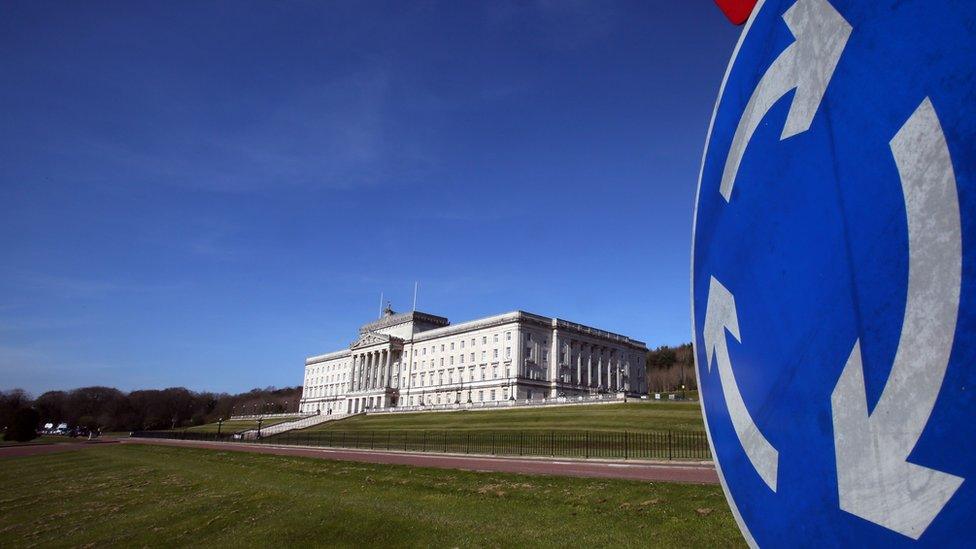'No change in NI talks process' despite general election
- Published
- comments

James Brokenshire has warned that there will either be direct rule or another election if there is no agreement reached by early May
The Northern Ireland secretary has said there will be no change in Stormont's talks process despite the announcement of a snap general election.
James Brokenshire also said he will fast-track laws through parliament by early May if a deal can be reached.
Theresa May announced a plan to call an election for 8 June. Leaders of the DUP and Sinn Féin welcomed the decision.
The announcement came during a pause in talks to restore devolved government in Northern Ireland.
Stormont's parties have yet to reach agreement on forming an executive six weeks after the assembly election.
A Downing Street spokesperson has confirmed that Taoiseach (Irish prime minister) Enda Kenny was one of a number of world leaders that Mrs May spoke to on the phone following her announcement.

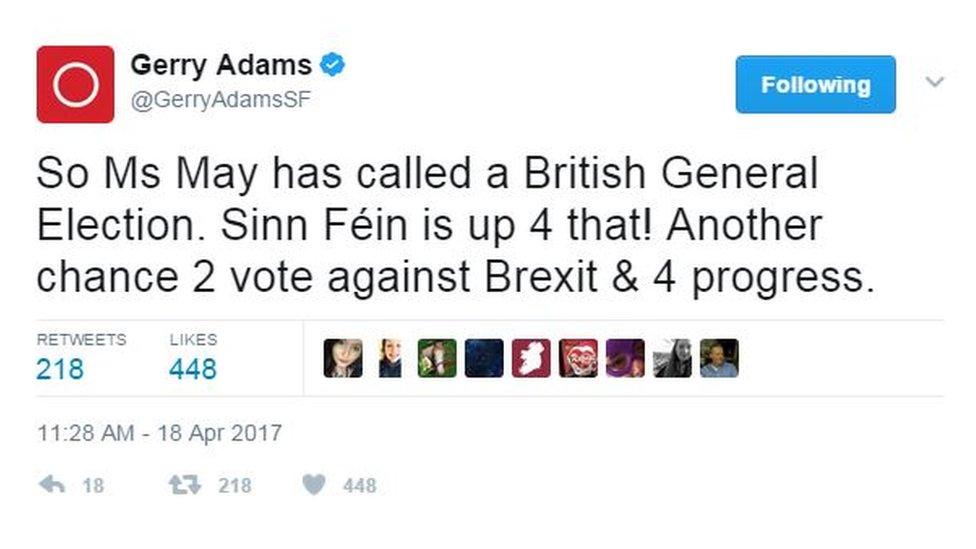

Mr Brokenshire had warned that there will either be direct rule from Westminster or another election if there is no agreement reached by early May.
Speaking after the plan for a general election was announced, he said: "Discussions between the parties and the UK and Irish governments will continue in accordance with the three-stranded approach.
"The prospect of a forthcoming UK general election does not change this approach.
The moment PM called for general election
"In addition, I believe it is also right to introduce provisions that would enable an executive to be formed in early May should agreement be reached.
"To have this legislation in force in time, I will be requesting that its progress through parliament be fast-tracked."
He said he also intended to introduce legislation addressing immediate issues such as setting a regional taxation rate to allow rates bills to be introduced by councils.
Irish Foreign Minister Charlie Flanagan said he told Mr Brokenshire he was "concerned" about the effect the election would have on the talks process.

Analysis: Chris Page, BBC News Ireland correspondent
We're looking at yet another election during the worst political crisis Northern Ireland has faced in the last 10 years.
In the last Assembly election in March, there was a significant shift in the landscape. Sinn Féin came within a whisker of becoming the largest party at Stormont.
That result, and the ongoing debate around Brexit, has led to more talk about the possibility of a united Ireland.
That means this general election will be about, more than ever before, unionism versus nationalism - orange versus green.
The prospect of another divisive election is unlikely to encourage the parties to compromise during the political talks.

Mr Flanagan said that while legislation could facilitate an executive being formed, he was "conscious of the political reality that all of the parties involved in the talks will now be competing in a general election".
"Nevertheless, it is the firm hope of the Irish government that the talks process can continue and conclude successfully in the coming days."
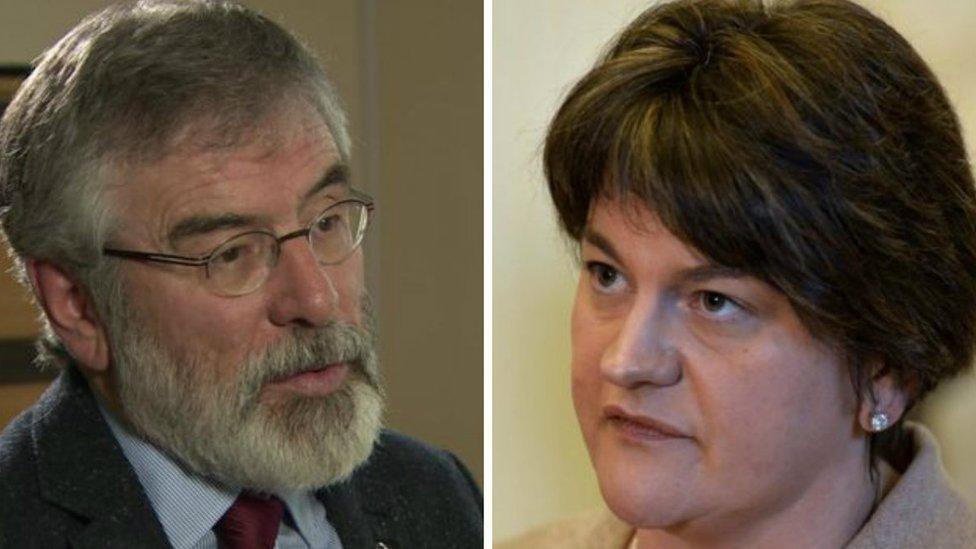
Gerry Adams and Arlene Foster both said a general election would be an opportunity for voters
DUP leader Arlene Foster said the election was an "opportunity to vote for the union" while the party's deputy leader Nigel Dodds said the announcement was a "surprise".
He said the election would have a big impact on the talks: "The next six or seven weeks are going to be dominated entirely by the issues in the general election.
"I think that's inevitable - once a prime minister fires the starting gun then everything else becomes subservient to it."
Sinn Féin leader Gerry Adams tweeted that it was another chance to vote against Brexit and the party's northern leader Michelle O'Neill said the election would be "an opportunity for voters to oppose Brexit and reject Tory cuts and austerity".
However, SDLP leader Colum Eastwood said the prime minister's announcement reflected "the disdain she holds for Northern Ireland and attempts to restore power-sharing government".
"It tells you all you need to know about Theresa May that she would call a snap Westminster election in the middle of intense efforts to restore power-sharing government here," he said.
"From the beginning of her tenure as British prime minister she has shown very little but disinterest and disdain for this place."
He added: "We now have an opportunity to strengthen the mandate of parties which campaign against and consistently voted against Brexit at Westminster."
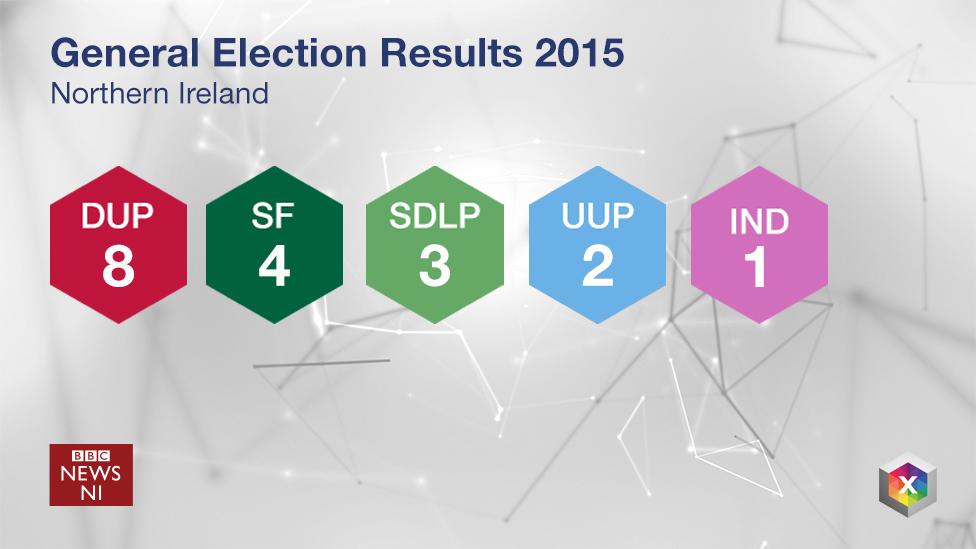
The DUP has eight of Northern Ireland's 18 MPs, making it the fifth largest party in the House of Commons
Ulster Unionist leader Robin Swann said the election would be "about strengthening the hand of the United Kingdom in forthcoming Brexit negotiations".
"Northern Ireland needs strong representation in Westminster now more than ever, arguing the best case for Northern Ireland," he added.
Tom Elliott, the UUP's MP for Fermanagh and South Tyrone, told BBC Radio Ulster's Evening Extra that he believed the election meant a deal at Stormont was "pretty much dead in the water".
Alliance Party leader Naomi Long said it would be "disgraceful" if any political party used the impending election to withdraw from the talks process.
She added: "The chances of a deal this side of 8 June have now become more remote. Despite this, the people of Northern Ireland have already given MLAs a clear instruction to do their job and to act responsibly in putting in place progressive and sustainable devolution."
In the 2015 general election in Northern Ireland, the DUP won eight seats, Sinn Féin won four, the SDLP won three, two went to Ulster Unionists and one independent was elected.
- Published18 April 2017
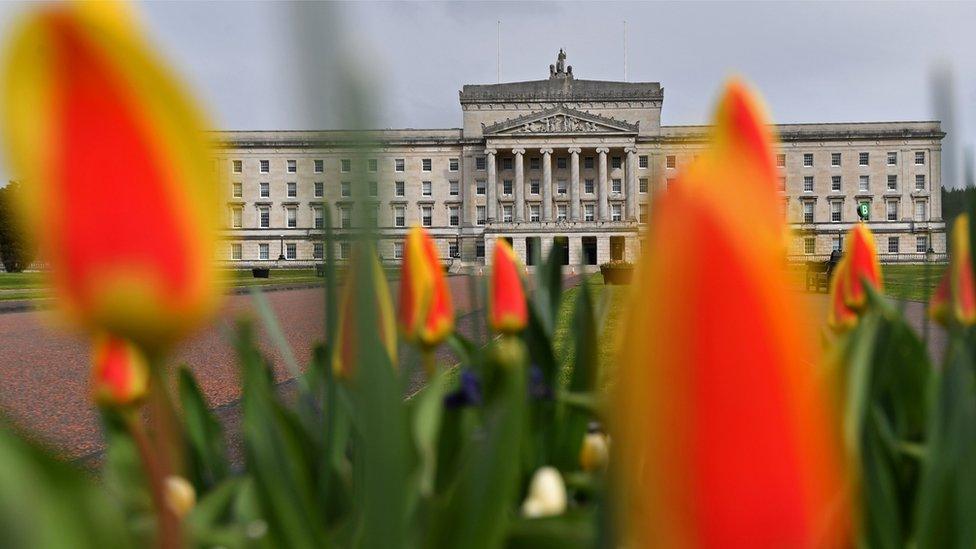
- Published18 April 2017
